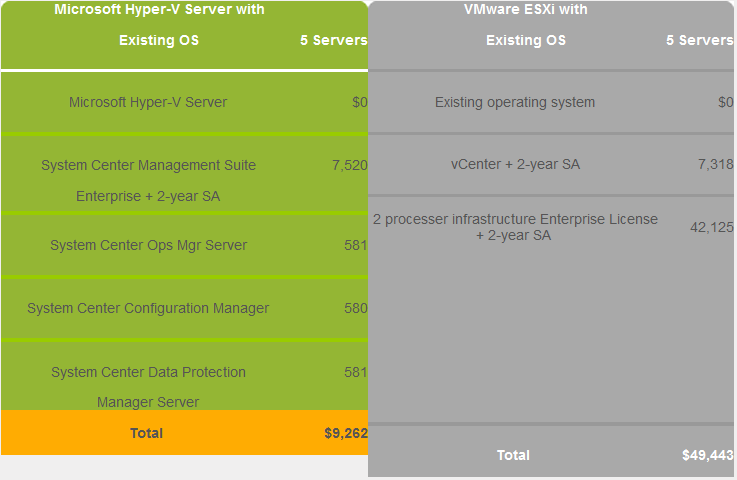Hyper-V vs. VMware Comparison
| Choosing the right Virtualization software for your datacenter is a complex task. Microsoft's Hyper-V has become a formidable competitor to VMware, especially with Windows Server 2008 R2. So we thought we would share our experience via this comparison of VMware versus Hyper-V, the leading server virtualization solutions. |
|
Hyper-V versus VMware - Pricing Take a look at the following table, you will see side-by-side the cost comparison of Hyper-V vs VMware. All of VMware feature comparisons use Virtual Infrastructure Enterprise and most of its pricing comparisons use Virtual Infrastructure Foundation. Costs are for five physical servers. We've made the assumption that you've already paid for the host server OS in this comparison. |

The following chart compares VMware Enterprise core features with Microsoft Windows Server 2008 Hyper-V (r2) and System Center Management core features.

VCB: VMware Consolidated Backup SMSE: System Center Server Management Suite
VMM: Virtual Machine Manager DPM: Data Protection Manager
Notes:
With Microsoft, virtualization with Hyper-V was built into Windows Server 2008. For heavy Microsoft shops, this means tighter integration with your existing infrastructure and management tools. Since Hyper-V is part of Windows Server 2008, your IT staff will use it seamlessly because they are familiar with the Windows look-and-feel.
Fewer virtual machines, in some situations, can be run on Hyper-V than you can on ESX Server, but Hyper-V is based on Windows Server 2008 and because of that you can run these machines on pretty well any hardware configuration, any hardware configuration that is designed to support Windows. You can only run VMware on maybe dozens or fewer number of server configurations than you can run Windows. That means that Hyper-V can be run on hundreds and hundreds, if not thousands, of configurations whereas because ESX Server, VMware is a more limited product because of that.
One thing that Microsoft has done very well is that they have tried to add as many management tools for virtualization as possible and of course, the market leader in terms of virtualization management tools is VMware. Microsoft has almost as many tools as VMware in terms of virtualization management.
Microsoft, by the way, just upgraded the number of cores that you can run with Hyper-V by releasing support for Intel’s new 6-core processors, so that means you can now run up to 24 cores.
Microsoft supports a limited number of Linux distributions (today SUSE), so keep that in mind. If you have a wider number of platforms to support, VMware ESX is your choice.
Hyper-V lets you manage virtual and physical environments and uses common deployment, provisioning, monitoring, and backup methodologies across both. VMware’s answer to management is to use Virtual Infrastructure Enterprise and Virtual Center, but even these tools won't allow to manage multiple hypervisors, physical resources or applications. You may also want see how Hyper-V compares to Xen.
Virtualization Consultants from Miles Consulting Corp
Regardless of your choice between VMware and Microsoft Hyper-V, our team of Server Virtualization Consultants will help your organization to select the right virtualization technology. They also will help you plan, install, configure and optimize your chosen virtualization platform. Feel free to call us for a free demonstration.
The original artical comes from http://www.milesconsultingcorp.com/Hyper-V-versus-VMware-Comparison.aspx.



 浙公网安备 33010602011771号
浙公网安备 33010602011771号